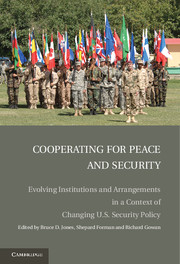 Cooperating for Peace and Security
Cooperating for Peace and Security Book contents
- Frontmatter
- Contents
- Contributors
- Foreword
- Acknowledgments
- I FRAMEWORK
- 1 Introduction: “Two Worlds” of International Security
- 2 “The Mission Determines the Coalition”: The United States and Multilateral Cooperation after 9/11
- 3 UN Transformation in an Era of Soft Balancing
- II ADAPTING COLD WAR INSTITUTIONS
- III NEW TOOLS, NEW MECHANISMS
- IV CONCLUSIONS
- Index
- References
1 - Introduction: “Two Worlds” of International Security
Published online by Cambridge University Press: 22 January 2010
- Frontmatter
- Contents
- Contributors
- Foreword
- Acknowledgments
- I FRAMEWORK
- 1 Introduction: “Two Worlds” of International Security
- 2 “The Mission Determines the Coalition”: The United States and Multilateral Cooperation after 9/11
- 3 UN Transformation in an Era of Soft Balancing
- II ADAPTING COLD WAR INSTITUTIONS
- III NEW TOOLS, NEW MECHANISMS
- IV CONCLUSIONS
- Index
- References
Summary
SETTING THE STAGE: HEGEMON CONSTRAINED?
On March 29, 2005, to the delight of the assembled diplomats, UN Secretary-General Kofi Annan walked into the Security Council chamber and bested the United States.
It was fifteen years after the end of the Cold War, and ten years after France's President Chirac had termed the United States a “hyperpower.” In the previous two years, the United States had invaded Afghanistan and ousted the Taliban from its former safe haven and put on an extraordinary display of military might in the first phase of the Iraq war. The U.S. economy was operating with a massive surplus, and the U.S. military was not just unrivaled in contemporary terms but was realistically being described as the most powerful military force in history. In book after book, international relations scholars and historians eschewed the debate about whether there was an American Empire and turned their minds to such questions as: was the Empire good for American values and interests; was it liberal; was it stronger than the British Empire at its height; and how long it would last.
Five years earlier, a confident American public, basking in eight years of prosperity and relative peace overseen by the Clinton administration, elected to office George W. Bush and the neoconservative wing of the Republican party, waving the flags of American dominance and contempt for multilateralism.
- Type
- Chapter
- Information
- Cooperating for Peace and SecurityEvolving Institutions and Arrangements in a Context of Changing U.S. Security Policy, pp. 3 - 19Publisher: Cambridge University PressPrint publication year: 2009


